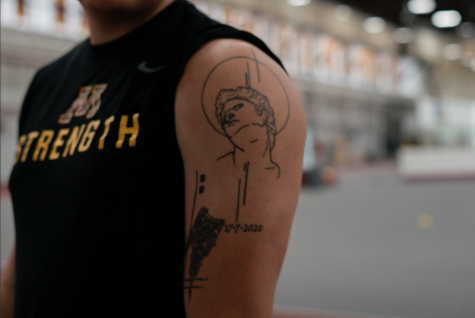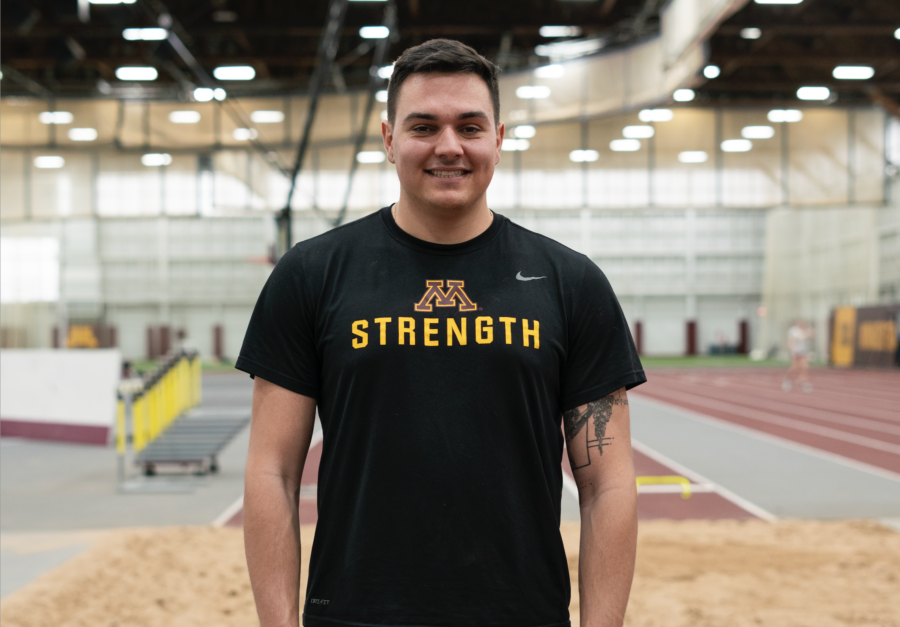Minnesota’s hammer throw group was ranked first in the nation on Monday by the U.S. Track and Field and Cross Country Coaches Association. Leading the group was junior Kostas Zaltos, a 23-year-old Greek superstar with aspirations bigger than the village where he grew up.
Last week at the Clyde Hart Classic, Zaltos launched the hammer for a personal best 73.36 meters (240 feet, 8 inches), a measurement that would have placed second in last year’s NCAA championships.
His talent was visible well before committing to Minnesota. He competed in U20 world competitions across Europe and was wildly successful in Greece’s national competitions. Since his arrival, his performance in the hammer throw has only improved, garnering the attention of NCAA coaches toward the University of Minnesota’s men’s track and field program.
Despite the acclamations and accolades, which he said he appreciates, Zaltos is not finished. In fact, there might not be a ceiling for the two-time Big Ten champion.
“I’m No. 12 in the world. I don’t feel like this,” Zaltos said. “I’m feeling uncomfortable right now with my position. And if I want to improve my position, I have to work even harder.”
But if anyone has proved they can excel in uncomfortable situations, it’s Zaltos.
Growing up in Greece
Zaltos was raised in Pedino, a Greek village in the Kilkis region with a population that fluctuates around 800. During his childhood, Zaltos was most interested in playing basketball and did so until he was 14. That was when Giannis Christoglou, his soon-to-be high school coach, introduced him to the hammer throw.
Christoglou was passionate about youth sports and advocated for increased funding for programs around Kilkis. His efforts fell short and financial aid never transpired, so he took matters into his own hands, literally.
“My coach at home built everything by himself,” Zaltos said. “Basically, he’s been spending his own money to build these facilities for the last 30 years.”
Zaltos began to train under Christoglou and, after his first win, decided to pursue throwing events. He continued to practice in the cages forged by Christoglou’s imagination.
Christoglou’s will to let nothing stop him from chasing his dream inspired Zaltos. Pairing this with his newfound potential, Zaltos dropped his life in Greece for a chance to compete in the United States.
Minnesota throwing coach Peter Miller traveled to Sweden for the 2019 European Athletics U20 Championships on his first-ever recruiting assignment. Zaltos heard about Miller’s plan to travel and contacted him over Facebook, asking to speak with him in person. Miller obliged.
To this day, Zaltos said he still remembers the conversation and how Miller’s genuine kindness made him feel. Perhaps the translator used verbiage favorable to Miller, or Zaltos was caught up in the excitement of it all. Either way, Zaltos decided to make Minneapolis home.
Three months and a pandemic
Zaltos toured the campus with his teammates soon after his arrival. He walked with his jaw dragging across the sidewalk in awe of the towering buildings. Once his crew reached Minnesota’s brand-new Fieldhouse, his awe turned to disbelief.
“The facilities are really beautiful and [were] the first thing that stood out to me [on] day one,” Zaltos said. “I saw everything, and I fell in love with it.”
For the next three months, Zaltos used University resources to help him adapt to life in the US.
Whether throwing hammers into nets, tossing the much dreaded 35-pound weight or hitting the books to improve his English, he found a way to practice every day. His persistent determination to succeed while overseas was sourced from a quote his grandfather back in Greece told him.
“I remember him telling me the secret of success. You need three things: practice, practice and practice,” Zaltos said. “Basically, stay consistent and follow your dreams till the end if you want to make them come true.”
However, Zaltos’ dream came to a halt when pandemic lockdowns began.
Miller assured it would be okay for Zaltos to fly back to his family in Greece and “wait for when things open up again.” Due to Greece’s strict travel policies, it would be another 10 months until Zaltos stepped foot into the Fieldhouse again.
Back in Pedino, restrictions hit Zaltos hard. For months, he sat inside, locked in, unable to access Christoglou’s handmade facilities. He took his classes online, but the eight-hour time difference led to many long nights, putting a strain on his mental health and his motivation to continue studying abroad.
At one point, he texted Miller he no longer wanted to come back and wished to stay home. Miller tried to convince Zaltos to come back, saying, “You have a chance to do a lot of things.”
Ironically, Miller said the University’s decision to cut indoor tack incentivized Zaltos to return.
“[Zaltos] talked to me and said ‘I don’t have to throw weight anymore?’” Miller said. “I was like, ‘Well, we’ll still compete in it a little bit, but we won’t train.’”
Zaltos overheard Miller telling the story and paused his warm-down exercise to celebrate. Miller laughed and said the extra reps during weight throw competitions have helped improve Zaltos’ numbers this year.
Motivation from the Mediterranean
Surely, Zaltos saw the omission of weight throw from his typical routine as addition by subtraction. But, according to him, this wasn’t the crucial moment that changed his mindset and later defined the trajectory of his future.
The moment that “flipped the switch,” from being lost without direction to a world-class athlete, occurred months before the University cut indoor track and field.
“It switched when my grandfather died during COVID,” Zaltos said.
He then pulled his sleeve up to show a tattoo embedded on his bicep. He moved his finger across his arm, underlining a series of numbers commemorating the day his grandfather died.

“He was the greatest man I’d ever met in my entire life,” Zaltos said. “After [his death], I said to myself, ‘Alright, it’s time to be like him.’”
When Zaltos returned to Minnesota, Miller said he was surprised to see how much his body had changed since the pandemic.
“He came back in January of 2021 about 50 pounds heavier than he is right now. Maybe not that much, but quite a bit heavier,” Miller said. “And so we spent a lot of time that year re-getting in shape, getting connected, losing some weight, re-figuring out English and then had a good year.”
Zaltos added, “Missing my grandfather was a big factor for me and changed my whole mindset, my course, my physique — it changed everything, it changed my whole life.”
That year, Zaltos won the first of his two Big Ten titles in the hammer throw, finished third in the NCAA Championships and was named Big Ten Freshman of the Year. He then took his heroics back to his hometown in Greece during summer break and helped orchestrate a relief effort for the people affected by the wildfires in Evia.
Or, in his words, “doing what I was supposed to do.”
As Zaltos walked from camera to camera talking to several news stations about track and field’s recent success, he carried a smile that beaconed across the Fieldhouse. A smile that affirmed he is living out the dream he once dropped everything for.
But with Zaltos, there’s always a way to be better than the year before. A way to build off his dream.
He gives himself one big goal every season.
However, he won’t share yet and plans not to until the end of the season.
“Right now, the season is still going. I can’t tell my big goal. I can’t tell my dreams,” Zaltos said. “But I can tell you that we are in a good spot to do GREAT things. Great with capital letters.”














